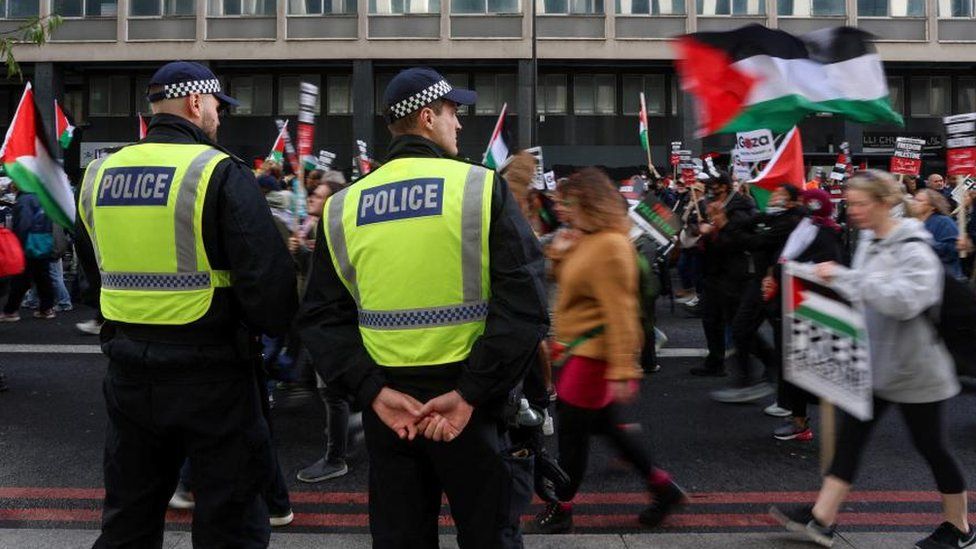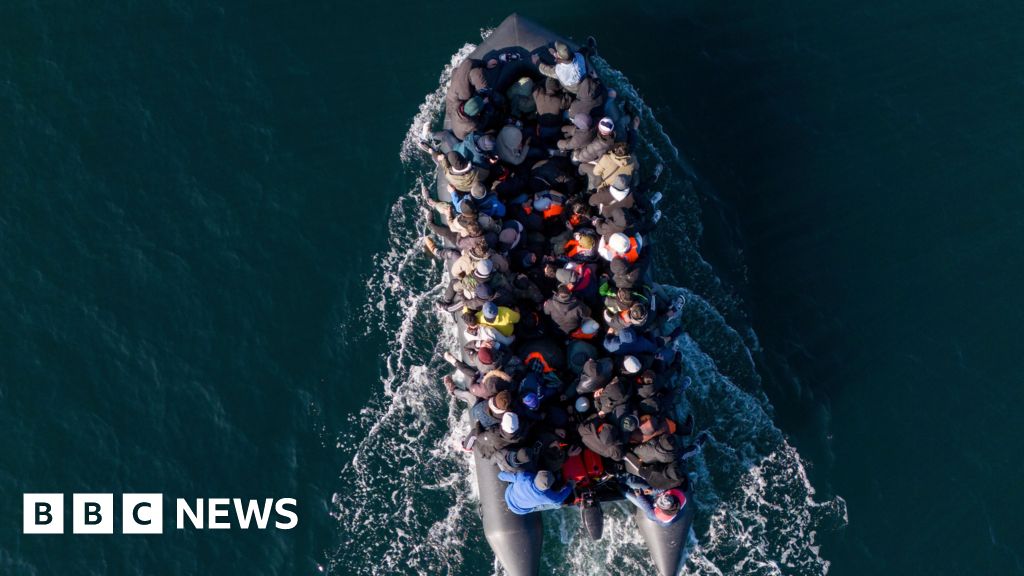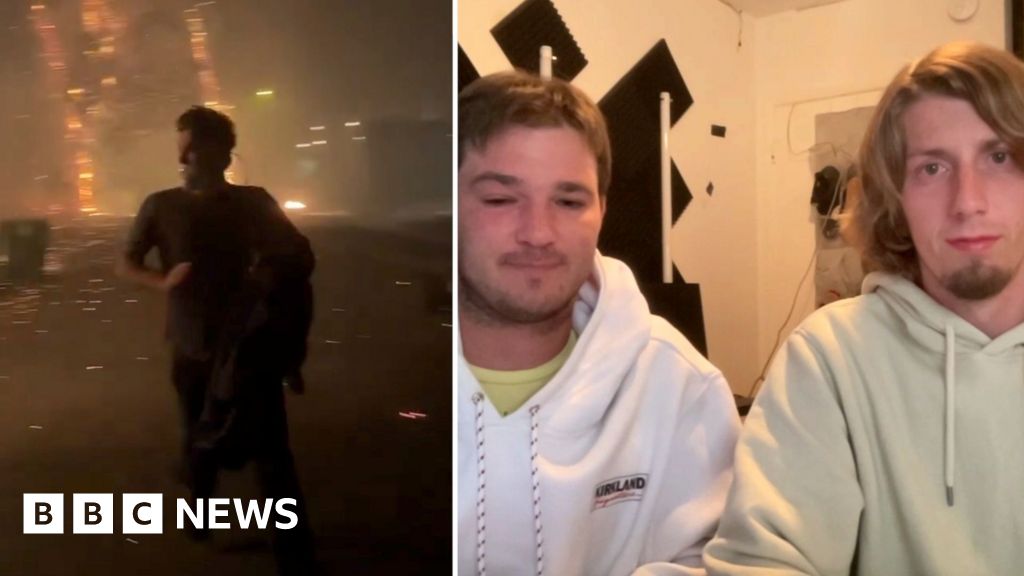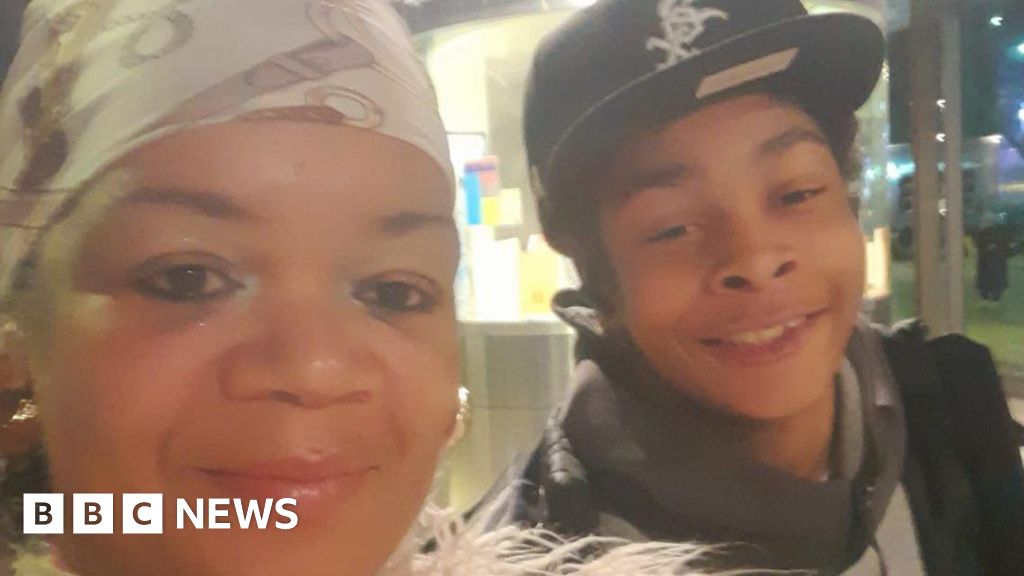 Image source, Reuters
Image source, Reuters
By Dominic Casciani and Sean Seddon
BBC News
The Metropolitan Police is preparing for an unprecedented security operation ahead of a pro-Palestinian demonstration in London on Saturday.
The force expects the march - which coincides with Armistice Day - to be the largest yet, and has warned there is a risk of clashes.
Pro-Palestinian protesters gathering near the Cenotaph can be arrested under sweeping measures announced by the Met.
Rishi Sunak has repeated his view the timing of the march is "disrespectful".
The prime minister urged protesters to be "mindful of the fear and distress in Jewish and Muslim communities" when they gather on Saturday.
The Met has said it will deploy 1,850 public order officers on duty on Saturday, and another 1,375 on Sunday.
It expects Saturday's demonstration to be the largest since weekly pro-Palestinian marches began in early October, and warned it is likely to be a "challenging" and "tense" situation in the capital.
An exclusion zone will be in place around the Cenotaph and a large swathe of Whitehall, which the Met says will "in effect" ban pro-Palestinian protesters from these locations and goes further than the security measures usually deployed around the key Remembrance site.
A dedicated 24-hour police presence is already in place around the Cenotaph, which will remain until after Sunday's ceremony.
The Met expects a larger number of counter-protesters - including members from far-right groups and football hooligans - to be in London compared to previous weekends, and there are concerns about the potential for clashes.
Unlike pro-Palestinian protesters, they will be allowed into Whitehall and near the Cenotaph, with the plan centred on keeping the two groups apart.
Deputy Assistant Commissioner Laurence Taylor, who is leading the operation, said he is concerned breakaway groups could "seek each other out".
He told reporters it is "likely we will see police having to use force" in order to prevent serious disorder, and said the Met is ready to implement a "huge" security operation in order to reassure local communities.
The Palestine Solidarity Campaign, which has organised the march, has repeatedly stressed this week their route does not go past the Cenotaph or through Whitehall, and have rejected the Met's public appeals to postpone.
No major protest is scheduled to take place on Remembrance Sunday. The demonstrations have taken place on successive Saturdays.
But on Friday the force reiterated concerns about disruptive breakaway groups, saying their "behaviour has been escalating and becoming more violent and distressing to the public" as the weekly protests have continued.
Senior officers have signed off the use of powers to carry out widespread stop-and-search operations, and to compel protesters to remove masks.
Other security measures announced by the Met include:
- Exclusion zones around the US and Israeli embassies
- Plans to prevent a "convoys of cars" carrying pro-Palestinian protesters, which is expected to arrive from elsewhere in the UK, reaching Jewish communities
- Working with British Transport Police to protect poppy sellers at stations
- A "dispersal zone" in a busy central London area, preventing breakaway groups from gathering later in the day
Met Commissioner Sir Mark Rowley said earlier this week the legal threshold which would allow him to ask the Home Office for permission to ban the march has not been met. He also stressed there are no powers in UK law to ban a static demonstration.
The prime minister said the police had give assurances about taking the necessary steps to safeguard Remembrance services.
"Protests will only be permitted far away from Remembrance events, and the Cenotaph in Whitehall - the abiding symbol of Remembrance - has been placed in an exclusion zone and will be guarded around the clock to protect it for those travelling to pay their respects," Rishi Sunak said.
Image source, EPA-EFE/REX/Shutterstock
The build-up to the latest pro-Palestinian demonstration in London has been dominated by a political row over Mrs Braverman's comments about the Met in the Times newspaper.
She claimed aggressive right-wing protesters were "rightly met with a stern response", while "pro-Palestinian mobs" were "largely ignored" - accusing the force of applying "double standards".
It later emerged that she had defied a Downing Street request to tone the article down, including - according to the Times - a comparison between pro-Palestinian demonstrations and marches in Northern Ireland.
Critics of Mrs Braverman says she has undermined the principle of independent policing, and potentially broken the ministerial code by not agreeing her remarks with No 10.
A source close to the Home Secretary said she met with the Met commissioner on Friday afternoon, where she "emphasised her full backing for the police in what will be a complex and challenging situation and expressed confidence that any criminality will be dealt with robustly".
The prime minister has so far stood behind his Home Secretary, but Downing Street was "still looking in to what happened with [Mrs Braverman's] op-ed" on Friday afternoon.
Mr Sunak's spokeswoman repeatedly refused to say whether or not he had recently spoken to Mrs Braverman about the article or the protests.
BBC News has been told a formal investigation has not been launched, and it is unclear when any conclusions around the circumstances of the article will be reached.
Any decision on Mrs Braverman's future is unlikely to be made ahead of Saturday's protests.
In a separate update on Friday, the Met said it had made 188 hate crime arrests since the 7 October attacks on Israel, a majority of which were for suspected anti-Semitic offences.
 (1).png)
 1 year ago
20
1 year ago
20


















